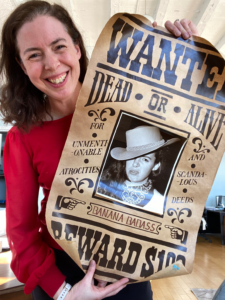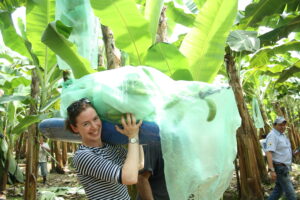
Just a few months from her 30th Trinity Reunion, we caught up with Jennie Coleman ’93 to reminisce, catch up, and learn about her quest for “Global Fairtrade Banana Domination.”
Arriving at Trinity
When Jennie Coleman arrived at Trinity from Ottawa in 1989, she thought she would ultimately become a diplomat. “At that time, most of us first years in International Relations were either planning to be diplomats or lawyers,” she says. Looking back, she marvels at their limited scope of projected pathways: “When we’re young, we just have no idea what the world is going to be like.”
After completing her first year in the IR program, Coleman realized it wasn’t for her. She focused instead on Political Science and German, completing her undergraduate degree in 1993 and a Master’s degree in German from U of T in 1994.
Experiences abroad
While at Trinity, Coleman had the opportunity to study in Germany for her third year, which piqued her interest in living abroad. Eager to explore the world, she joined a volunteer organization after graduation and spent two years living in Namibia, first working as an English resource teacher, and then establishing a library and reading program in the primary school where she volunteered.
Her time in Namibia sparked a first-hand understanding of the value of fair trade practices for Coleman. “I learned it was trade, not aid, that makes a community work and thrive,” she says. “The ability to make their own economic decisions, to invest in their communities the way they see fit, on their own terms, is essential for healthy, sustainable growth.”
Building an international career
When she arrived back in Canada, Coleman enrolled in Western University, completing a second Master’s degree, this time in Library and Information Science. After realizing she “had to have a job,” she landed on Bay Street, working in the heart of Canada’s financial district for the Office of the Superintendent of Financial Institutions. Then it was on to a researching role at McKinsey, followed by an opportunity at Bombardier’s head office in Montreal. It wasn’t long before the company offered Coleman a post in Zurich (she speaks German, French and English fluently). Stints in Berlin and China followed, before Coleman and her husband (they met at Bombardier in Europe) returned to Montreal with their growing family.
Becoming an entrepreneur
Did you know that bananas are the number one fruit consumed in Canada by a landslide? That we eat, on average, 15 kilograms of bananas each year, followed by apples at around 10 kilograms? That bananas are in 72 percent of shopping baskets at the grocery store?
Neither did Coleman until she was presented with the opportunity to buy Equifruit, a Fairtrade certified banana importer, in 2013. By then a mother of three, she was looking for more flexibility in her career than what her corporate role offered. “For years, I’d had a hankering to have my own business. I would share my ideas at the dinner table most nights. And then this opportunity sort of fell from heaven,” she says.
Coleman bought Equifruit in 2013. “The idea behind the business was extremely exciting to me,” she says. The first few years were a steep learning curve, and the company was in financial turmoil. “If you’d told me that I was going to be so anxious I wouldn’t sleep for the first two years, maybe I would have opted to buy a dry cleaning business in my neigbourhood instead,” she laughs.
These days, Coleman sleeps a little better. Equifruit achieved 139% growth from 2018-2021, and the company has received positive press coverage from national newspapers, trade publications, marketing schools, and social media (more on that later). The quest for “Global Fairtrade Banana Domination” is ongoing, with Equifruit’s bananas carried in grocery stores across Ontario and Quebec so far.
A big win was the 2021 decision of one major Toronto area supermarket chain to carry only Equifruit bananas in its 36 locations. Stores included education at the displays explaining the importance of Fairtrade (and why shoppers shouldn’t balk at paying 30 cents more per pound for their favourite fruit). Sales of bananas remained unchanged, with most customers voicing their support for the change.
What sustainability really means
Question: What do sharks have to do with bananas? The short answer: It doesn’t matter.
In an effort to win consumer hearts and minds, Equifruit has taken a creative approach to communicating its mission, with a vibrant website that takes visitors through a few fun images (one of a shark eating a banana) before getting to this message:
“We grew tired of people snoozing at the importance of fair pay and safe working conditions for banana farmers. We’ve added some bells, whistles and well-meaning fake news to keep the conversation fresh. Equifruit is un(officially) the most “Extra” Fairtrade banana brand out there. Eat your heart out.”
The site is the result of a “fresh take” rebrand by Equifruit in 2020 to reach a broader consumer base than the niche segment of organic Fairtrade consumers it previously targeted. The brand strategy takes a playful approach to educating consumers about the importance of Fairtrade practices through TikTok dances, memes, Facebook cartoons and clever Tweets, most with the hashtag #bananabadass.
Coleman becomes serious when the conversation turns to sustainability, however. “Often when people think about sustainability, they think of it from an environmental perspective,” she says. “But true sustainability is broader than that. There are really three pillars of sustainability: economic, social and environmental sustainability. We can’t, for example, focus solely on carbon emissions, because do we want to reduce carbon emissions on a product that has been made by someone who has been paid poverty wages, who is working under terrible, unsafe conditions? We must think holistically about the products that we are buying and the way we are consuming, every day. It’s not easy to do, and I am far from perfect. But once you learn how supply chains are built, you can’t unlearn that.
“That’s what’s so lovely about the Fairtrade system,” Coleman continues. “Growers must follow those three pillars of sustainability. And then I can stand up with confidence and say, this banana has been produced on a farm with transparent, traceable administration where workers are treated fairly and can earn a sustainable living.”
Coleman is “thrilled” about what Trinity College is doing—and planning—on the sustainability front, including the construction of the Lawson Centre for Sustainability. She is quick to point out her pride at Trinity receiving its designation as a Fair Trade Campus in 2016.
Sharing what she’s learned
Coleman smiles as she thinks back to her early days as an undergrad at Trinity. “At the time, the only path I could imagine to an international career was to become a diplomat. But as soon as you’re working in international supply chains with international partners, you’re having a career in international business.”
She is regularly invited to university lecture halls to share her experiences as an entrepreneur and international Fairtrade business owner. She has also contributed course material through a university textbook, The Fair Trade Handbook: Building a Better World, Together.
Reunion 2023: Celebrating a milestone
This spring marks 30 years since Coleman graduated from Trinity. She smiles as she remembers her younger self. “I lived in residence at St. Hilda’s and I loved it. I met my Trinity friends there—there are seven of us—and they are still my best friends.
“If you lived in residence, everything was social,” she says, recalling debates at The Lit, a turn in a Trinity College Dramatic Society production, playing cello in the Hart House Orchestra, a memorable performance with friends in a Trinity Review fundraiser for Casey House, attending the Saints’ Ball, and playing hockey on the Trinity women’s intramural hockey team. “We were the worst!” she laughs. I played on hockey on figure skates. If we lost the game by less than five goals, we still declared it a victory. We just had so much fun.”
Coleman also credits her experiences as a Trinity student with helping to instill a sense of self-confidence. “I think the advantage to Trinity is being with people who are interested in thinking and talking about big ideas. Those conversations, along with being away from home, challenged me in a way I really enjoyed and still do to this day. So when the opportunity to become a business owner presented itself, although I didn’t know how to run a banana company I decided I would learn how to do that. And I have.”
For Coleman, the path she started on at Trinity 30 years ago hasn’t led where she imagined it would—and she wouldn’t change it for anything.

Story by Jennifer Matthews

Sorry, comments are closed for this post.